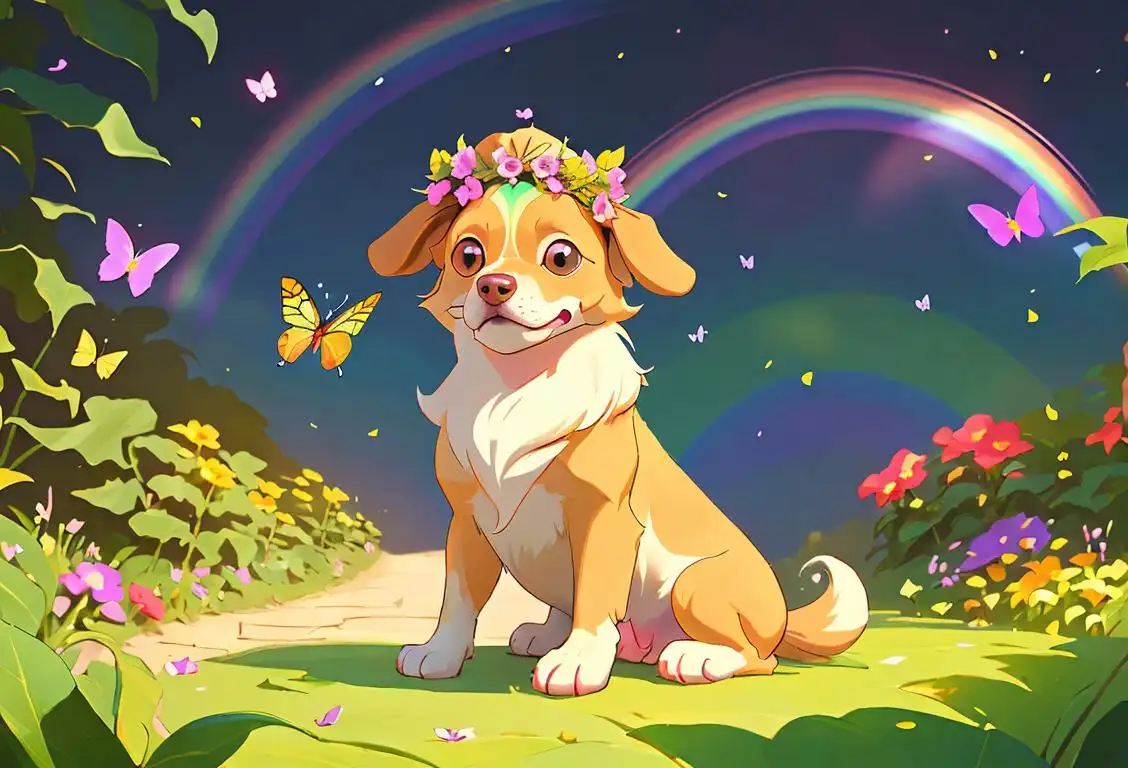National Holistic Pet Day

Welcome to National Holistic Pet Day, a day dedicated to giving our furry friends some extra TLC and promoting their overall well-being. Whether you're a proud pet parent or simply an animal enthusiast, get ready to celebrate and pamper your pets like never before!
When is Holistic Pet Day?
It's national holistic pet day on the 30th August.
A Holistic Approach to Pet Health
On National Holistic Pet Day, pet owners across the country come together to embrace a holistic approach to keeping their pets happy and healthy. But what exactly does 'holistic' mean when it comes to our furry companions?
Well, a holistic approach means addressing all aspects of an animal's well-being, including their physical, mental, and emotional health. It's not just about treating symptoms with medication but rather finding natural and alternative ways to enhance their overall quality of life.
From incorporating natural and organic food into their diet to providing mental stimulation through interactive toys, there are so many ways to practice holistic pet care. It's about understanding that our pets are more than just animals – they're part of our families!
The Benefits of Holistic Pet Care
Not sure if a holistic approach is right for your pet? Well, let us share some benefits that might just convince you:
- Improved Physical Health: Natural and organic food can improve digestion, reduce allergies, and boost overall immunity.
- Enhanced Mental Stimulation: Engaging toys and puzzles keep your pet's mind sharp and prevent boredom.
- Emotional Well-being: Spending quality time with your pet, providing proper socialization, and ensuring a stress-free environment all contribute to their emotional well-being.
Now that you know the advantages of holistic pet care, let's delve into some fun ways to celebrate National Holistic Pet Day!
How to Celebrate National Holistic Pet Day
1. Treat Your Pet to a Spa Day: Book a grooming session or give your pet a home spa treatment with all-natural pet shampoo and conditioner.
2. Whip Up Homemade Treats: Show your pet some love by baking healthy treats using pet-friendly ingredients.
3. Get Active Together: Engage in physical activities that both you and your pet enjoy, such as hiking, swimming, or playing in the park.
4. Practice Mindfulness: Set aside some time to be present with your pet. Meditate together or simply enjoy a peaceful moment of bonding.
Remember, celebrating National Holistic Pet Day is not just about spoiling your pet with treats and toys. It's about creating a balanced and healthy lifestyle that will benefit them in the long run.
History behind the term 'Holistic Pet'
1960
Emergence of Alternative Medicine
The term 'holistic' emerged in the 1960s as part of the broader movement towards alternative medicine. People began seeking alternatives to conventional medical practices and started exploring natural and holistic approaches to health and wellness. This shift in mindset marked the beginning of a new era in pet care as well.
1970
Emergence of Alternative Medicine
In the year 1970, alternative medicine began gaining popularity as a holistic approach to healing. People started embracing natural remedies and practices that focused on treating the whole body rather than just the symptoms. This shift in mindset opened the door for holistic pet care to develop.
1970
Emergence of Holistic Medicine
In the 1970s, holistic medicine gained popularity as an alternative approach to conventional veterinary care. This holistic approach aimed to treat animals not just based on their physical symptoms but also considering their emotional, mental, and spiritual well-being. The term 'holistic' originates from the Greek word 'holos,' meaning 'whole.' It emphasizes the importance of viewing animals as integrated beings rather than focusing solely on their physical health.
1970
Emergence of the Holistic Approach
In the early 1970s, a new concept called 'holistic' began to gain popularity in various fields, including medicine, psychology, and nutrition. The term 'holistic' emphasizes the interconnectedness and balance of all parts within a system. This approach was based on the belief that treating the whole person, rather than just the symptoms or specific parts, leads to better overall health and well-being.
1960
Emergence of Holistic Veterinary Medicine
In the 1960s, the concept of holistic veterinary medicine emerged as a response to traditional practices that focused primarily on treating symptoms rather than considering the whole well-being of animals. Holistic veterinarians started exploring alternative therapies such as acupuncture, chiropractic care, herbal medicine, and nutritional therapy to address both the physical and emotional health of pets.
1969
Emergence of Holism
The concept of holism, which is the idea that a whole system is more than the sum of its parts, started gaining popularity in various fields including medicine and psychology. This holistic approach emphasized the interconnectedness of the mind, body, and spirit for overall well-being.
1985
Introduction of Holistic Veterinary Medicine
Around 1985, holistic veterinary medicine emerged as a response to the growing interest in alternative pet care. This approach sought to combine traditional veterinary practices with natural and holistic treatments. It aimed to promote the overall well-being of pets through a balance of physical, mental, and emotional health.
1980
Holistic Pet Food
During the 1980s, the concept of holistic pet food emerged. This step aimed to provide animals with a well-rounded and natural diet that promotes overall health and addresses specific dietary needs. Holistic pet food typically includes high-quality ingredients, such as whole meats, fruits, and vegetables, while avoiding artificial additives, preservatives, and fillers. It emphasizes the importance of nutrition as a vital component for supporting an animal's overall well-being.
1985
Transition to Holistic Pet Care
As the holistic approach gained traction in human healthcare, pet owners and professionals started recognizing the importance of applying similar principles to the well-being of their animal companions. In 1985, the concept of 'holistic pet care' emerged, focusing on a comprehensive approach to pet health that considers physical, mental, and emotional aspects. This marked a shift from solely relying on conventional veterinary medicine and embracing a more integrative approach.
1990
Incorporation of Holistic Approaches in Pet Care
By the 1990s, the holistic approach to pet care gained significant recognition. Veterinarians, pet owners, and animal lovers began to appreciate the importance of integrating holistic practices and natural remedies to enhance the overall health and happiness of pets. This shift in mindset led to the increasing popularity of holistic pet care products and services.
1970
Awareness of Natural Pet Care
During the 1970s, awareness regarding natural pet care started to gain traction. Pet owners recognized the importance of a balanced diet, exercise, and minimizing exposure to toxins. The concept of holistic pet care started to take shape, encompassing not only physical health but also emotional well-being.
1970
Rise of Natural Pet Care Movement
As people started becoming more conscious about their own holistic health, the idea of extending this approach to their pets gained attention. The natural pet care movement emerged, focusing on using natural remedies, organic diets, and alternative therapies to improve the overall health and well-being of pets.
1990
Holistic Pet Care Products
In the 1990s, the term 'holistic pet' started to extend beyond just food and encompassed a broader range of products and services. Holistic pet care products, including grooming supplies, supplements, and natural remedies, gained popularity among pet owners seeking alternative and natural solutions for their pets' health and wellness. This step reflected the growing demand for holistic approaches in caring for animals and the belief in natural remedies as an alternative to traditional veterinary medicine.
1975
Introduction of Holistic Pet Care
Holistic pet care emerged as a distinct term as veterinarians and pet owners recognized the importance of treating pets as whole beings. This approach emphasized preventive care, balanced nutrition, natural remedies, and a focus on emotional and behavioral aspects of pet health.
1998
Publication of 'The Holistic Animal Handbook'
In 1998, 'The Holistic Animal Handbook' by Kate Solisti-Mattelon was published, further popularizing the term 'holistic pet.' This comprehensive guide provided insights into holistic pet care, including information on nutrition, natural therapies, and the importance of a holistic lifestyle for pets.
2002
Introduction of 'Holistic Pet' Term
In 2002, the term 'holistic pet' was officially introduced to describe the idea of treating pets as whole beings, considering their physical, mental, and emotional well-being. Holistic pet care emphasizes the use of natural and alternative therapies, along with conventional veterinary medicine, to promote optimal health and prevent illness in pets. This term quickly gained popularity and became associated with a more comprehensive and compassionate approach to pet care.
1980
Integration of Holistic Practices
In the 1980s, holistic practices began finding their way into mainstream pet care. Veterinarians started offering alternative therapies such as acupuncture, homeopathy, and herbal medicine alongside traditional treatments. This integration of holistic practices expanded options for pet owners, emphasizing a more comprehensive approach to pet health.
1990
Expansion of Holistic Pet Products
By the 1990s, the holistic pet movement had begun to flourish. Pet owners became increasingly interested in alternative therapies, natural remedies, and organic diets for their pets. This led to the development and expansion of a wide array of holistic pet products, including organic food, herbal supplements, acupuncture services, and homeopathy treatments. The market for holistic pet care quickly grew, catering to the desire for a more natural and holistic approach to pet wellness.
1990
Holistic Pet Food Industry
The 1990s saw the rise of the holistic pet food industry. Pet owners became increasingly aware of the impact of nutrition on their pets' overall well-being. Holistic pet food aimed to provide wholesome, natural ingredients without artificial additives or preservatives. This shift in the pet food market mirrored the growing interest in holistic pet care.
2000
Holistic Veterinary Care
By the 2000s, the concept of holistic pet care expanded to include holistic veterinary care. Holistic veterinarians integrate conventional veterinary medicine with complementary and alternative therapies, such as acupuncture, chiropractic, herbal medicine, and homeopathy. This approach focuses on promoting overall wellness and addressing the underlying causes of illness rather than solely treating symptoms. Holistic veterinary care became a sought-after option for pet owners seeking a more comprehensive and personalized approach to their pets' healthcare needs.
1990
Holistic Pet Food Industry
With the increasing demand for natural and holistic pet care, the pet food industry began offering specialized holistic pet foods. These foods were formulated with high-quality, natural ingredients and free from artificial additives, fillers, and by-products, aimed at maintaining optimal health and vitality in pets.
2005
Recognition and Integration
As holistic pet care became more mainstream, veterinary organizations and professionals acknowledged its value and started integrating holistic methods into their practices. Many veterinarians pursued additional training in holistic modalities, such as acupuncture, chiropractic care, and traditional Chinese medicine, to complement their conventional medical knowledge. This integration of conventional and holistic approaches provided pet owners with a broader range of options for their pets' health and care.
Present
Holistic Pet Care as a Growing Trend
Today, holistic pet care is a thriving trend, with many pet owners actively seeking out holistic veterinarians, nutritious diets, and natural products for their beloved companions. The holistic pet industry continues to expand, offering a wide range of services, including chiropractic adjustments, acupuncture, herbal supplements, and stress reduction techniques. The holistic pet approach has proven to have a positive impact on the overall well-being and quality of life of pets, contributing to their longevity and happiness.
2005
Rise of Holistic Pet Products
Around 2005, the market for holistic pet products experienced significant growth. As pet owners became more conscious about their pets' well-being, there was an increase in the availability of natural and organic pet foods, supplements, and remedies. Holistic pet products aimed to support pets' health using natural ingredients and sustainable practices.
2000
Expansion into Holistic Pet Services
The holistic approach expanded beyond nutrition and medical care to include various services such as acupuncture, chiropractic care, massage therapy, and herbal medicine for pets. These alternative therapies complemented traditional veterinary care and aimed at providing comprehensive holistic support to pets.
Present
Continued Growth and Awareness
Today, holistic pet care is widely known and embraced by a significant number of pet owners. The movement has expanded beyond healthcare and nutrition to include other aspects of pet well-being, such as behavior, environmental enrichment, and energy healing. Holistic pet care continues to evolve, with ongoing research and advancements in understanding the interconnectedness of physical, mental, and emotional health in animals. This approach strives to provide pets with a well-rounded, natural, and effective way to thrive.
2010
Recognition by Mainstream Veterinary Community
By 2010, the term 'holistic pet' had gained recognition within the mainstream veterinary community. Veterinarians started incorporating holistic methods into their practices, embracing a more comprehensive approach to pet healthcare. This recognition led to the integration of holistic techniques, such as acupuncture and herbal medicine, alongside conventional veterinary treatments.
2000
Expanding Holistic Approach
By the early 2000s, the holistic pet care approach had gained significant popularity. Pet owners were now incorporating various holistic practices, such as chiropractic care, massage therapy, and energy healing, into their pets' treatment plans. The emphasis on holistic treatments continued to grow, reflecting the evolving attitudes towards pet health.
2010
Growing Popularity and Awareness
The term 'holistic pet' grew in popularity as more pet owners recognized the benefits of a holistic approach in promoting their pets' well-being. Increased awareness of the importance of a balanced lifestyle, natural remedies, and preventive care led to a significant shift in the way people cared for their pets.
Present
Ongoing Popularity and Advancements
Today, the concept of a holistic pet continues to thrive, with pet owners actively seeking natural and holistic approaches to care for their furry friends. The field of holistic veterinary medicine continues to advance with ongoing research and innovative treatments. The term 'holistic pet' has become synonymous with a holistic lifestyle dedicated to the overall well-being of pets.
Did you know?
Did you know that a study has shown that owning a pet can lower blood pressure and cholesterol levels? So, not only are our furry friends adorable companions, but they're also good for our health!Tagged
fun loved ones healthFirst identified
30th August 2015Most mentioned on
30th August 2018Total mentions
159Other days
Best Fried Day
Getoutside Day
Cancer Prevention Day
Father Daughter Take A Walk Day
Health Commission Will Start Releasing Coronavirus Updates Twice A Day
Holistic Pet Day
Happy Hugs Day
Health And Fitness Day
Walk Day
Stroke Day








